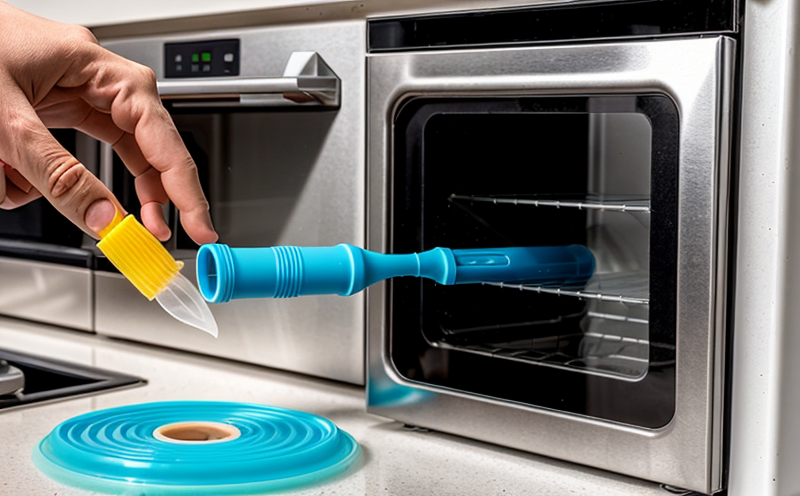ASTM D2240 Household Plastics Hardness Testing
The ASTM D2240 test method is widely used to measure the hardness of household plastics. This test is essential for quality assurance, product development, and ensuring compliance with international standards. In this section, we will discuss the specifics of ASTM D2240 testing, its relevance in the polymer & plastics sector, how it aids in household plastic testing, and real-world applications.
The hardness of a material can significantly impact its usability and durability in various applications, especially for household products like containers, toys, and electronics. The ASTM D2240 test provides an accurate measurement of the resistance to indentation, which is critical when evaluating plastics intended for consumer use.
The test involves applying a specified force using a steel indenter on a sample at room temperature. The resulting depth of penetration is then measured and used to calculate the hardness value according to the formula:
Hardness (H) = (Force applied / Area of indentation) * 10^3This calculation provides a standardized measure that allows for comparison between different materials under consistent conditions.
The ASTM D2240 test is particularly relevant in the household plastics sector as it helps manufacturers ensure their products meet safety and performance standards. This ensures consumer satisfaction and reduces the risk of product failure or injury. The test also supports regulatory compliance, which is vital for businesses operating internationally.
For R&D engineers, this testing method offers a means to innovate by experimenting with new materials that can withstand various levels of stress without compromising on quality. Quality managers use such tests as part of their routine checks to maintain consistent product quality across batches and over time.
- International Acceptance: ASTM D2240 is recognized globally, making it a key standard for household plastics testing in countries that adhere to international trade agreements.
In summary, the ASTM D2240 test method provides critical data on plastic hardness, ensuring product safety and compliance. It plays a pivotal role in quality assurance processes within the polymer & plastics sector, particularly where household plastics are concerned.
Eurolab Advantages
At Eurolab, we pride ourselves on providing top-tier services that meet all your testing needs. Our experience and expertise ensure accurate and reliable results every time. Here’s why you should choose us for ASTM D2240 household plastics hardness testing:
- Precision Instruments: We use state-of-the-art instruments to conduct the tests, ensuring precise measurements.
- Experienced Technicians: Our team consists of highly trained professionals who understand the nuances of this test method.
- Rapid Turnaround Times: We offer quick turnaround times without compromising on quality.
- Comprehensive Reporting: Our reports are detailed and include all relevant data points for a thorough analysis.
- International Standards Compliance: We ensure our tests comply with international standards, including ASTM D2240.
Our commitment to excellence is reflected in the trust we’ve earned from clients across various industries. Whether you need one-off testing or regular quality checks, Eurolab is your partner for all your testing requirements.
Quality and Reliability Assurance
Quality assurance (QA) and reliability are paramount in the production of household plastics. Ensuring that products meet the required standards not only enhances consumer confidence but also protects brands from potential legal issues. ASTM D2240 plays a crucial role in this process by providing consistent, repeatable measurements of plastic hardness.
When conducting QA tests using ASTM D2240, it is important to follow established procedures meticulously. This includes selecting appropriate samples that represent the intended product type and condition, ensuring the test environment meets specified conditions (such as temperature and humidity), and using calibrated instruments for accurate readings.
The results from these tests are vital for making informed decisions about production processes, material selection, and end-product performance. By incorporating ASTM D2240 into their QA protocols, manufacturers can identify potential issues early in the development cycle, leading to cost savings and improved product quality.
Reliability assurance is equally critical when dealing with household plastics. Consistent hardness values across different batches or over time indicate stable manufacturing processes, which translate directly into more reliable products for consumers. Any deviations from expected results could signal underlying problems that need addressing before they become significant issues affecting end-users.
In conclusion, incorporating ASTM D2240 into your quality assurance and reliability programs ensures you have robust data supporting your claims about product performance and safety. This helps build trust with customers while maintaining compliance with relevant regulations.
International Acceptance and Recognition
- American Society for Testing and Materials (ASTM): ASTM D2240 is one of the most widely recognized standards internationally. It ensures uniformity in testing procedures across different regions.
- European Committee for Standardization (CEN/ISO): The standard aligns well with European norms, facilitating smoother trade between EU member states and non-EU countries.
- International Electrotechnical Commission (IEC): While not directly applicable to plastics testing, IEC standards often harmonize with ASTM guidelines for broader technical compatibility.
- Australian Standards (AS/NZS): Australia and New Zealand have adopted ASTM D2240 as part of their national regulations, ensuring consistency in household product safety assessments.
- Japanese Industrial Standards (JIS): Japan follows similar practices regarding material hardness testing using standards like JIS K7136 which closely aligns with ASTM D2240.
- Other International Bodies: Many other international bodies have endorsed or adapted ASTM D2240 for their own purposes, further emphasizing its global relevance and acceptance.
The universal applicability of ASTM D2240 makes it an ideal choice for manufacturers exporting goods to multiple markets. By adhering to this standard, companies can streamline their compliance processes, reduce costs associated with multiple certifications, and enhance market access in diverse regions.





